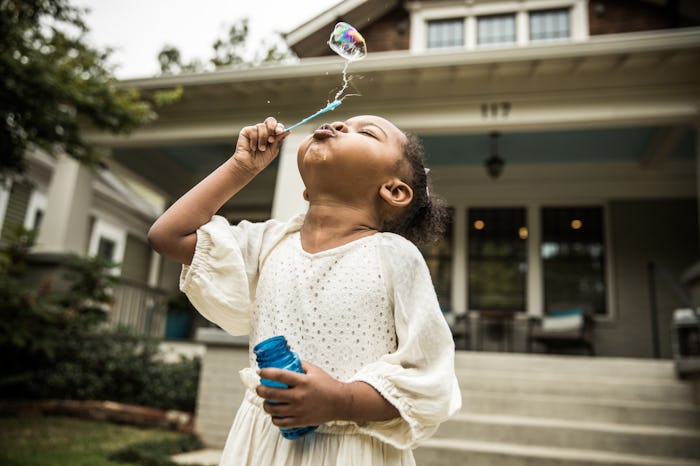Parenting

It's True — Your Child Is *Way* More Adaptable Than You, & Here's Why
Most days, it feels like the world around us has never been more unstable. Between the COVID-19 pandemic, the panic surrounding climate change, and the very real political issues we all face every day (just to name a few things), it seems like w're in a constant state of tumultuous change. As parents, it's easy to spend a lot of time worrying about how this much change will affect our children, even when many people say they'll be OK because of how resilient they are. But are children really more adaptable than adults? How well do they really deal with so much change, and is too much of it going to have a negative effect on them?
The good new is that, in general, children are actually more adaptable than adults. Mia Rosenberg, LCSW, psychotherapist and owner of Upsider Therapy, explains to Romper, "Because children have less world experience and knowledge, they are not able to think about all of the consequences of a given situation and do not yet have an adaptable skills set to handle a situation they have never faced before. Throughout their lives, adults have learned to develop a reaction and adaptation to certain situations — essentially, develop a schema— that primes them on how to navigate different obstacles. Because children’s brains are developing rapidly, they are able to bounce back quicker than an adult; they are able to learn skills and cope at a quicker rate." In this case, the fact that kids don't know a lot about the world really works in their favor.
Bridget Barrett-Parker, M.Ed, parenting coach and consultant, goes into slightly more detail about how a child's development affects their ability to deal with change. "During the first few years of life, children’s brains are creating millions of neural connections every hour. After that rapid creation, they begin the process of pruning, or losing the neural connections that they don’t actively use," she tells Romper. "Remember that phrase 'If you don’t use it, you lose it'? That’s exactly what is happening. Because there are so many different connections, different ways of the brain being wired, it’s easier for a child to make the shift into a different pattern of thinking. It requires less effort than it does for an adult, who has highly myelinated pathways, and is therefore much harder to shift, though not impossible."
If all of that is true, then it makes sense to wonder why a routine is so necessary for a child's well-being. Barrett-Parker points out that while children do need and crave predictability and structure, they need this more for little things than bit things. "Because they can’t distinguish what is hugely important versus what is trivial — which comes from having lots of life experience determining what is important and what is trivial — they may become upset about small things being out of place while seemingly fine about bigger changes," she says.
So, yes, at the end of the day, your little one is going to adapt better to huge changes than you might — or at least they're going to do so faster. But that doesn't mean you should encourage them to ignore this kind of thing completely. There are a few important things to keep in mind when approaching big life changes with children. Barrett-Parker points out that how we, as their parents, talk about the change is the most important.
She encourages parents to speak about changes honestly and concretely. "For instance, if you are moving, tell them that you will not be sleeping in your house any more, but will be sleeping in a new house," she says. "If a pet has died, tell them that their heart stopped beating, not that they have been put to sleep — you might have some worried children, thinking that if they go to sleep, they will never wake up." Be prepared to talk about these things a lot — kids will need repetition to really understand it.
Rosenberg says that you also want to give your kids the space and time they need to adjust. "In order for children to develop healthy coping skills within a given situation, it is so important that they have the room to figure out what the changes may be without making it feel like their world is ending," she says. "Providing just enough information to help them understand what is going on, validating that it can feel hard, and allowing them the space to process it with a trusted adult are the three key factors in addressing life changes with children."
It's also extremely important for you, as the parent, to stay strong. "Children learn from example. The way you interact with the world informs how they begin to interact, as well," Barrett-Parker says. "If you are sad, talk about being sad and what things you do to cope with sadness. Model what it looks like to make the best of a situation, even in the face of big feelings."
Lastly, offer as much structure and consistency as you can continue to offer. "This will help show your child that you can navigate a change and adapt to a new situation, while also having other parts of their lives feel stable," Rosenberg explains. This can be as small as continuing to read to them every night before bed like you did before.
Experts:
Mia Rosenberg, LCSW, psychotherapist and owner of Upsider Therapy
Bridget Barrett-Parker, M.Ed, parenting coach and consultant and Montessori trained teacher
This article was originally published on